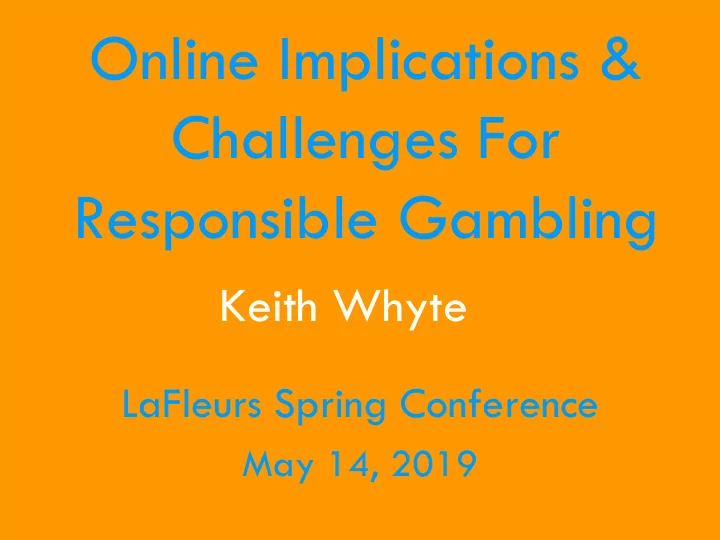

Online Implications & Challenges For Responsible Gambling Keith Whyte LaFleurs Spring Conference May 14, 2019
About NCPG • The national advocate for programs and services to assist problem gamblers and their families • NEUTRAL on legalized gambling. • Founded in 1972 • Work with government, gaming industry, regulators, legislators, media & community • 3 membership classes; 19 lotteries + 11 lottery vendors
Implications & Solutions • Online opponents will • Federal legislation may continue to draw you be a “least worst” into their fight. possibility. • In absence of data • Allay fears and identify lawmakers, media and solutions by sharing other stakeholders data and working with 3 rd party validators. assume the worst.
How Can We Help? • Internet Responsible Gambling Standards. Developed 2012, update underway. Eight critical aspects of operations. • Internet Compliance Assessment Program (iCAP) launched in 2014 to assess compliance with IRGS. Uses independent assessor to review application, test features and provide recommendations to applicants & NCPG.
IRGS Sections • Policy • Self Exclusion • Training • Advertising • Informed Decision • Game Features Making • Research • Assisting Players
POLICY • Policy commitment to responsible gambling • The operator has a responsible gambling strategy with: • defined goals • formal budget • designated senior management representative • clear plan of action. • A portion of all gambling revenue must be dedicated to reduce the social costs of gambling addiction.
STAFF TRAINING • All staff who have contact with players, as well as corporate staff members, are trained in responsible gambling at their hiring and are retrained regularly. • Training standards set & approved by regulators and/or NGO.
INFORMED DECISION MAKING • Primary responsibility is with the player to make responsible decisions. • Must have help to make an informed choice. • Provide a variety of information to assist players. • How the games work. • Information on odds, randomness & myths. • Understand how to use RG tools. • Budgeting, amount of play, cost of play calculators.
ASSISTING PLAYERS • Clear policies are in place for assessing and handling situations where a player indicates they are in distress or experiencing problems. There is a procedure in place to address third party concerns. • At least supervisors, and ideally all floor employees are knowledgeable about the helpline, self-exclusion/timeout, responsible gambling and local help resources and able to provide that information on request.
SELF-EXCLUSION
ADVERTISING AND PROMOTION • The operator has a clearly articulated commitment to advertising that does not mislead or target people with gambling problems or minors. • Advertising is not misleading about outcomes of gambling and does not misrepresent the odds of winning/losing.
GAME FEATURES Regulations to govern potentially deceptive features: • Near miss • Loss disguised as a win • Stop buttons • Skill mechanics
RESEARCH • Monitoring of key metrics using variety of data sources: • From population to individual level survey • Academic & market studies • Casino information (credit, security, player tracking, rewards/bonusing, host, etc …) • Survey both locals & tourists. • Feedback loop to build efficient & effective programs.
Current iCAP
Conclusions • Technology can and should be leveraged to support responsible gaming and provide positive solutions. • In increasingly competitive and contested national gambling field 3 rd party validators like NCPG and iCAP are essential.
NCPG 730 11th Street, NW, Suite 601 Washington, DC 20001 +1.202.547.9204 keithw@ncpgambling.org www.ncpgambling.org @ncpgambling
Recommend
More recommend